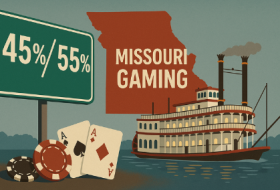
Ohio lawmakers are making another attempt to legalize online casinos after failing in 2024. The bill, SB 197, was introduced this week by state Sen. Nathan Manning. It would allow up to 11 online casino brands with a tax rate of 36% to 40%, the highest among iGaming states. The proposal would also allow online lottery and parimutuel betting.
Last year, Manning was a co-chair of a study commission appointed to learn about the current gambling market and whether new forms of gambling are possible. The majority of the commission members recommended the legalization of online casinos and iLottery to the General Assembly. At the time, Manning was for iLottery but against iGaming, stating that the topic needed more vetting.
Meanwhile, another iGaming bill is expected to be introduced in this year’s legislative session. Earlier this month, the House Finance Committee chair, Rep. Brian Stewart, confirmed he’s working on online gambling legislation.
Record taxes for online casinos
If it became a law, SB 197 would allow the four brick-and-mortar casinos and seven racinos to operate one online gambling platform each. Their tax rate would depend on whether they offer the games directly or through a partner.
Those who use an online platform in which they own at least 50% would pay a 36% tax. That would likely include, at minimum, MGM, Caesars, PENN, and Hard Rock.
Meanwhile, retail casinos that partner with third-party platforms such as FanDuel or DraftKings would pay 40%. At that rate, Ohio would be charging the highest tax of any US state with legal online casinos. For context, the current leader is Pennsylvania, where the aggregate tax rate averages out to about 35% (this varies month to month, as slots and table games are taxed at different rates). The national average is around 19%.
The master license holders for Ohio online casinos must pay an initial $50 million licensing fee for the first five years and a $5 million renewal fee afterward. For those with partners, the partner must also pay for a license at the same rate. Per SB 197, 99% of the revenue collected by the state would go to the Ohio General Fund, with the remaining 1% going to the state’s problem gambling fund.
If the bill becomes a law, the Ohio Casino Control Commission (OCCC) must set an iGaming launch date by March 31, 2026.
Some retail operators will likely oppose iGaming
As seen in other states, some retail property owners and labor unions will likely oppose legalizing online casinos. Two operators that have previously voiced opposition to iGaming expansion include Jack Entertainment and Miami Valley Gaming and Racing.
Jack Entertainment operates one racino, one land-based casino, and the betJack online sportsbook. Despite its online presence, the company has argued that legalizing online casinos would cannibalize its retail properties. Meanwhile, Miami Valley is co-owned by Delaware North Companies and Churchill Downs Incorporated. Churchill Downs once operated the TwinSpires online platform, but has since exited online gambling and has emerged as a vocal iGaming opponent in multiple states.
On the other hand, most other operators will likely be on the other side of the iGaming expansion argument. PENN Entertainment, which operates the ESPN Bet and Hollywood Casino platforms, runs four retail properties in Ohio. Other companies with retail presence in Ohio that have online brands include:
- MGM Resorts International, which co-owns the BetMGM brand.
- Caesars Entertainment, which owns several platforms, such as Caesars Palace Online Casino.
- Boyd Gaming, which owns Stardust Casino
- Hard Rock International, which owns Hard Rock Bet.
Limited iLottery options to start
In addition to iGaming, SB 197 would legalize online lottery. However, the list of available games will be short, at least initially.
Under the bill, state games such as Pick 3, Pick 4, Pick 5, Rolling Cash Five, and Classic Lotto will be available online. Additionally, “statewide joint lottery games” will be excluded for one year. That means Ohioans won’t be able to buy online tickets for games like Mega Millions and Powerball for one year after the bill becomes law. That narrows the possible online options to electronic scratch-offs and online keno.
In the meantime, Ohio lottery players can purchase tickets online through lottery couriers. These apps, including Jackpocket, Jackpot.com, and Lotto.com, purchase physical tickets on behalf of users.




